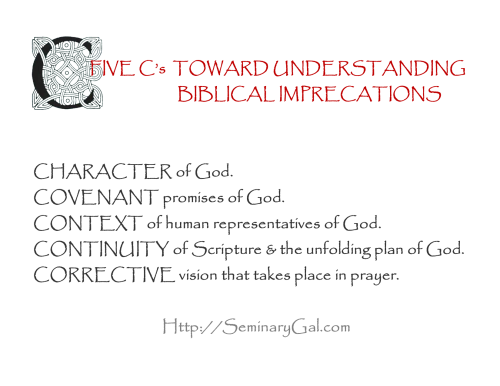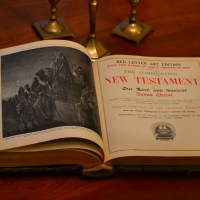5 C’s Toward Understanding Imprecatory Prayers–Message from Condell 6.15.2014
Praying the Unthinkable—5 C’s Toward Understanding Biblical Imprecations
Message given by Barbara Shafer at Advocate Condell Medical Center 6.15.2014
It’s Father’s Day and I thought that it might be good to make prayer a bit more interesting for the dads and men out there who might be tempted to view prayer as a chick-thing. You’ve seen it in real life or in movies: women in denim jumpers, clutching Bibles, heads bowed, and doing that “Mmmmm” of agreement.
 Prayer doesn’t have to be that way at all.
Prayer doesn’t have to be that way at all.
In fact, Jesus viewed it as a battlefield.
It is where the human reality confronts the spiritual war. The war between good and evil, right and wrong, just and unjust, holy and unholy, and the angelic versus the demonic. Jesus knew when He was praying, it was like “Up, Periscope!” In prayer, Jesus was bringing His concerns up to heaven—a realm from His familiar past—in a spiritual sense even though His body was still here down below. In prayer, He was encountering God His Father, and He was able to see beyond the earthly and became equipped for upcoming battles in the spiritual realm. Prayer, to Jesus, was a battlefield.
Let’s just start by acknowledging that God and Satan (who yes, I believe he’s real)—God and Satan are not equals. It’s not like we’re living a cliffhanger never knowing who’s going to win, God or Satan. We’ve got Revelation at the end of this Book. We already know who wins. God wins. But it doesn’t mean that the evil side, the dark side, won’t try to inflict as many casualties as possible along the way. If Satan’s going down, he wants traveling buddies…as many as he can get, if he has any say in it.
Enter prayers for and imprecatory prayer against one’s enemies. What’s a Christian to do: Should we pray FOR our enemies or AGAINST them?
Yes.
The answer is Yes. That’s the one word answer to the question of prayer when we view it as a battlefield. In a sense, when we’re praying for our enemies, we’re also praying against them. How can this be?
Well, we’re bringing our enemies out of combat mano-a-mano all the way from hand-to-hand…to handing them over to God on the spiritual battlefield in prayer. Keep that thought in mind (the handing of people over to God) as we look at two things that seem contradictory in the Bible.
What are those 2 seemingly contradictory things? (1) Jesus’ command for us to love our enemies and to pray for those who persecute us (Matthew 5:44). (2) And yet, God’s own Word contains all kinds of imprecatory prayer, psalms, and hymns from judges, prophets, kings, and psalmists who are praying the unthinkable:
- Calling down curses upon enemies like we saw in our Old Testament reading from this morning in 2 Kings 2:23-24. All the way to telling God of hatred for one’s enemies (Psalm 139:19 If only you would slay the wicked, O God! Away from me, you bloodthirsty men! 20 They speak of you with evil intent; your adversaries misuse your name. 21 Do I not hate those who hate you, O LORD, and abhor those who rise up against you? 22 I have nothing but hatred for them; I count them my enemies.)
- Judgment upon evildoers (Psalm 69:22 May the table set before them become a snare; may it become retribution and a trap. 23 May their eyes be darkened so they cannot see, and their backs be bent forever. 24 Pour out your wrath on them; let your fierce anger overtake them. 25 May their place be deserted; let there be no one to dwell in their tents. 26 For they persecute those you wound and talk about the pain of those you hurt. 27 Charge them with crime upon crime; do not let them share in your salvation. 28 May they be blotted out of the book of life and not be listed with the righteous.)
- Wrath upon unbelievers (Psalm 79:6 Pour out your wrath on the nations that do not acknowledge you, on the kingdoms that do not call on your name; 7 for they have devoured Jacob and destroyed his homeland.)
- Death to foes (Psalm 83:17 May they ever be ashamed and dismayed; may they perish in disgrace.)
- Striking down the opposition. (Psalm 10:14 But you, O God, do see trouble and grief; you consider it to take it in hand. The victim commits himself to you; you are the helper of the fatherless. 15 Break the arm of the wicked and evil man; call him to account for his wickedness that would not be found out. 16 The LORD is King for ever and ever; the nations will perish from his land. 17 You hear, O LORD, the desire of the afflicted; you encourage them, and you listen to their cry, 18 defending the fatherless and the oppressed, in order that man, who is of the earth, may terrify no more.)
- Annihilation, death, destruction, and cursing of young and old, men and women (Psalm 109:8 May his days be few; may another take his place of leadership. 9 May his children be fatherless and his wife a widow. 10 May his children be wandering beggars; may they be driven from their ruined homes. 11 May a creditor seize all he has; may strangers plunder the fruits of his labor. 12 May no one extend kindness to him or take pity on his fatherless children. 13 May his descendants be cut off, their names blotted out from the next generation. 14 May the iniquity of his fathers be remembered before the LORD; may the sin of his mother never be blotted out. 15 May their sins always remain before the LORD, that he may cut off the memory of them from the earth.)
- Obliterating evildoers from the face of the earth (Psalm 55:15 Let death take my enemies by surprise; let them go down alive to the grave, for evil finds lodging among them… 23 But you, O God, will bring down the wicked into the pit of corruption; bloodthirsty and deceitful men will not live out half their days.)
Yes, we might think of these as the psalmist’s version of man-movie-action-films that guys like to watch…with good guys and bad guys, action and suspense, battles and destruction; but more than that, they are also expressions of a human heart under great duress.
They are very real, very honest words of someone who is not taking matters mano-a-mano, into hand-to-hand combat with enemies in a physical sense, but rather is sending them “Up, Periscope” to get a different view, a Divine view, to see God’s purposes and His plan for the spiritual battle.
Depending on who you ask, there are between 3 and 20 of these imprecatory psalms in the Bible. Some psalms are completely devoted to death and destruction…getting kind of an R rating for violence in the movies. Some psalms have only a little bit of cursing going on and would be more like a PG13, parental guidance suggested.
If we look at Biblical imprecations overall, such as the one we heard this morning from 2 Kings, not just the ones in the psalter, we will see that they are perfectly consistent with a sovereign, holy, and loving God whether we’re considering OT imprecations or ones in the New Testament. Woes were spoken by Christ Himself and imprecation has been prayed by no less a Christian than the Apostle Paul (Galatians 1:8-9).
These words are consistent with Jesus’ command to love others and pray for those who persecute us…if we consider the 5 C’s Toward Understanding Biblical Imprecations:

Let’s look at these one at a time.
CHARACTER of God. When we know God’s character, we will share His hatred of sin. God is holy and therefore each and every evil act is unacceptable. In the US, we have diminished sin—to our own shame. Sin is abhorrent to God and it should be to us as well. Everyone likes the attribute God displays of His love and therefore, we’re glad that He’s loving toward each and every one of His creation. He would rather pay the price Himself than to see any one of His creation suffer simply because there was no way out for us who try hard to live righteously but fail because we’re human. He is merciful and therefore He will accept anyone who turns from evil and wants to be in relationship with God our Father. That’s the happy part from our perspective.
But, and this is important, He is also just—and no  God of justice would allow innocents to be harmed at the hands of sinners, never providing for vindication of the victims…never correcting the problem of evil by punishing evildoers somehow. God will not just pass over wrongdoing without ever punishing it. He didn’t say to Adam and Eve, “Aw go ahead. Do what you want. I LOVE you!” Nope. Sin had consequences. In love, God’s wrath was poured out against sin at the Cross of Christ, but that was not the end of the wrath against sin. Part 1 was offering forgiveness through Christ’s sacrifice, but He will also extend wrath beyond what Jesus endured to those unrepentant God-haters in the final Judgment…and only because they did not want the forgiveness Jesus offered to them.
God of justice would allow innocents to be harmed at the hands of sinners, never providing for vindication of the victims…never correcting the problem of evil by punishing evildoers somehow. God will not just pass over wrongdoing without ever punishing it. He didn’t say to Adam and Eve, “Aw go ahead. Do what you want. I LOVE you!” Nope. Sin had consequences. In love, God’s wrath was poured out against sin at the Cross of Christ, but that was not the end of the wrath against sin. Part 1 was offering forgiveness through Christ’s sacrifice, but He will also extend wrath beyond what Jesus endured to those unrepentant God-haters in the final Judgment…and only because they did not want the forgiveness Jesus offered to them.
God’s whole character is wrapped up in His Image—and we have the responsibility for image-bearing ever since God created Adam and Eve and said Genesis 1:26 “Let Us make man in Our image, according to Our likeness.” When we don’t act as God would, the WWJD, we humans give all of creation a faulty view of who God is. God is very concerned for His Image and His character. Therefore, He will correct any wrong portrayal of Him by evil human actions. It is His image-bearing as humanity’s privilege that makes our sin so wrong when we do it. It’s why evil must be punished. But furthermore, beyond God’s character, there are things that flow from His character, such as the second “C”–
The COVENANTS given by God to man. God fulfills His covenant promises and there are quite a few.
To Adam and Eve—in the protoevangelion in Genesis 3:15 which was the early promise of a Messiah: One who would strike the death blow to evil someday and restore our relationship back to what we had with God in the beginning. Blessing happens as the flip side of the destruction of evil.
To Abraham—from Genesis 12:1 The LORD had said to Abram, “Leave your country, your people and your father’s household and go to the land I will show you. 2 “I will make you into a great nation and I will bless you; I will make your name great, and you will be a blessing. 3 I will bless those who bless you, and whoever curses you I will curse; and all peoples on earth will be blessed through you.” We will refer back to this again because notice verse 3—both blessing and cursing are there. Flip sides of the covenant. Affirmed in Isaac through whom the promise was reckoned. And to Jacob’s descendant’s, the tribes of Israel through whom the covenant is fulfilled. Isaiah 41: 8 “But you, O Israel, my servant, Jacob, whom I have chosen, you descendants of Abraham my friend, 9 I took you from the ends of the earth, from its farthest corners I called you. I said, ‘You are my servant’; I have chosen you and have not rejected you. 10 So do not fear, for I am with you; do not be dismayed, for I am your God. I will strengthen you and help you; I will uphold you with my righteous right hand. 11 “All who rage against you will surely be ashamed and disgraced; those who oppose you will be as nothing and perish.”
Do you see how each covenant has both blessing and cursing as God fulfills His covenant promises?
To David whose dynasty/Messianic throne would be forever. 1 Chronicles 17:7 This is what the LORD Almighty says: I took you from the pasture and from following the flock, to be ruler over my people Israel. 8 I have been with you wherever you have gone, and I have cut off all your enemies from before you. Now I will make your name like the names of the greatest men of the earth. 9 And I will provide a place for my people Israel and will plant them so that they can have a home of their own and no longer be disturbed. Wicked people will not oppress them anymore, as they did at the beginning 10 and have done ever since the time I appointed leaders over my people Israel. I will also subdue all your enemies. “‘I declare to you that the LORD will build a house for you: 11 When your days are over and you go to be with your fathers, I will raise up your offspring to succeed you, one of your own sons, and I will establish his kingdom. 12 He is the one who will build a house for me, and I will establish his throne forever. 13 I will be his father, and he will be my son. I will never take my love away from him, as I took it away from your predecessor. 14 I will set him over my house and my kingdom forever; his throne will be established forever.'”
 Wickedness was punished in the great flood and evildoers were wiped off the face of the earth (cursing) while Noah and the righteous were preserved (blessing).
Wickedness was punished in the great flood and evildoers were wiped off the face of the earth (cursing) while Noah and the righteous were preserved (blessing).
Enemies have been cut off in the past and will be thwarted in the future! It may look like the evil side wins for a while, but they’ll be defeated in the end (cursing).
God Himself will do the blessing and the cursing—because He made covenants He didn’t have to make. His character is at stake since He would not be holy and perfect if He didn’t fulfill them.
God is ALWAYS good for what He has promised!
There is also the third “C”—the CONTEXT of the passages in which imprecations surface. The imprecatory Psalms, particularly of David, occur at a time during which humans acted as God’s representatives on earth, in more than the sense of ruling and subduing the earth. Acting justly—judging justly–is what good kings were supposed to do. In alignment with God’s will, they were to meter out justice. This is perfectly consistent with Paul’s letter to the Romans:
Romans 13:1 Everyone must submit himself to the governing authorities, for there is no authority except that which God has established. The authorities that exist have been established by God. 2 Consequently, he who rebels against the authority is rebelling against what God has instituted, and those who do so will bring judgment on themselves. 3 For rulers hold no terror for those who do right, but for those who do wrong. Do you want to be free from fear of the one in authority? Then do what is right and he will commend you. 4 For he is God’s servant to do you good. But if you do wrong, be afraid, for he does not bear the sword for nothing. He is God’s servant, an agent of wrath to bring punishment on the wrongdoer.
As God’s representatives, they were concerned for righteousness and stood against evil. Their role was to preserve God’s righteous rule, not subvert it for their own purposes.
 I can’t help but thing about what’s going on in the news right now in Iraq, with Prime Minister Nouri al-Maliki. Instead of putting people in charge of ruling and upholding justice and security who would seek God’s righteousness and stand for good against evil, he put people in leadership who would preserve his own power…who were aligned politically with him. No good can come from that.
I can’t help but thing about what’s going on in the news right now in Iraq, with Prime Minister Nouri al-Maliki. Instead of putting people in charge of ruling and upholding justice and security who would seek God’s righteousness and stand for good against evil, he put people in leadership who would preserve his own power…who were aligned politically with him. No good can come from that.
“Power tends to corrupt, and absolute power corrupts absolutely.” –Lord Acton
God’s true representatives consider power to be on loan, and restrict acts of judgment to those necessary to thwart evil. Furthermore, godly leaders have a very clear eye to being God’s representatives yet fallen people themselves. Each of us is a sinner. It’s a heavy responsibility for a sinner to be in a position of judgment over other sinners. It’s why God asks that we seek Him.
So the judges, the prophets, the psalmists and the good kings asked God to step in and protect the vulnerable and the innocent. In the OT particularly, the idea of covenant judgment of enemies had a purpose. It was to keep the chosen people (Israel) alive since we all needed them in order to have a Messiah who would save those who love God and give us life for all eternity. The Messiah was going to come from the Jewish people, the promise reckoned through Isaac and Jacob…and the Davidic line.
Sometimes it was necessary to kill off the unabashed enemies that would seek to annihilate the Israelites. We see that with Moses…and Pharaoh who wanted to kill all the male babies. We see that with Esther and Mordecai when Haman wanted to kill all the Jews in Xerxes’ kingdom. We see that with those trying to take the life of David to end the covenant promise before it was ever fulfilled. We see it with Jeremiah and Isaiah whose roles were to prophesy that God’s reign would continue even in the midst of captivity. They prophesied the Messiah who would come.
Do you see, punishing of God’s enemies is necessary for God’s plan for the future and cursing is the flip side of the covenant blessing of Abraham that God will fulfill?
 This brings us to the fourth “C”–the undeniable CONTINUITY of Scripture as it unfolds. Biblical continuity leads somewhere. The OT leads from Genesis showing the initial judgment of sin at Eden with the mortality of man to the anticipation of Jesus’ birth and the hope of redemption, the restoration of man. All the imprecations of the OT are designed to preserve the chosen people through whom the Messiah would come.
This brings us to the fourth “C”–the undeniable CONTINUITY of Scripture as it unfolds. Biblical continuity leads somewhere. The OT leads from Genesis showing the initial judgment of sin at Eden with the mortality of man to the anticipation of Jesus’ birth and the hope of redemption, the restoration of man. All the imprecations of the OT are designed to preserve the chosen people through whom the Messiah would come.
Elisha, our prophet from the OT reading this morning, had a role to fulfill as prophet and he couldn’t be attacked or killed by thugs who started with character assaults—which is what “baldhead” was in that culture—and still do his job with his reputation intact.
Imprecations handed people over to God and let God deal with the people who tried to thwart the plan of God.
Biblical continuity is God’s plan and it took a dramatic turn upward when Jesus was born. Enter the New Testament which takes this continuity from Jesus’ birth to final judgment of both man and created spiritual beings who turned bad, like the devil and his minions.
Imprecations serve to advance the story of redemption…for if Satan, demons, the antichrist, and those who hate God are saved, what good is the Gospel at all? What good would that kind of god be? If he simply ignored the truly depraved and completely unrepentant among us? Would he be holy? No. Would he be just? No. Would he be loving? NO! Therefore imprecations serve to advance the story of redemption and the human need for forgiveness of sin.
So do we pray with imprecations or not? Love enemies and pray for persecutors or not?
Jesus’ words need to be taken in context and while we are to love our enemies and pray for those who persecute us, we also need to see that the battleground is not just physical, up to us to fight mano-a-mano in hand-to-hand combat. Taking matters into our own hands. Because it’s not just physical. It’s also spiritual. So imprecations and pleas for God’s divine justice transcend the earthly. It’s “Up, Periscope” and we send our physical enemies into the spiritual battlefield where God fights our battles.
Think of it this way: When we’re praying for our enemies, we’re also praying against them. It’s the two sides of God’s character of love and justice. It’s the two sides of the covenants, both blessing and cursing. It’s the vertical beam of the Cross that is God’s responsibility alone and the horizontal beam of sinful man’s response. It’s letting God do the judging and the saving. Sometimes our enemies will turn from their evil ways and sometimes they’ll perish in them. Imprecatory prayers have only served to state what’s already on the heart of the righteous, agreeing with God that sin be judged and that God would do it. Acknowledging that the battle is His to fight and we’ve simply handed people over in prayer, sending them onto the spiritual battlefield for God to do it.
There’s a great passage to illustrate this in 2 Chronicles 20:5 Then Jehoshaphat stood up in the assembly of Judah and Jerusalem at the temple of the LORD in the front of the new courtyard 6 and said: “O LORD, God of our fathers, are you not the God who is in heaven? You rule over all the kingdoms of the nations. Power and might are in your hand, and no one can withstand you. [appealing to God’s CHARACTER] 7 O our God, did you not drive out the inhabitants of this land before your people Israel and give it forever to the descendants of Abraham your friend? [appealing to the COVENANT] 8 They have lived in it and have built in it a sanctuary for your Name, saying, 9 ‘If calamity comes upon us, whether the sword of judgment, or plague or famine, we will stand in your presence before this temple that bears your Name and will cry out to you in our distress, and you will hear us and save us.’ 10 “But now here are men from Ammon, Moab and Mount Seir, whose territory you would not allow Israel to invade when they came from Egypt; so they turned away from them and did not destroy them. [appealing to the CONTEXT of human representatives administering justice] 11 See how they are repaying us by coming to drive us out of the possession you gave us as an inheritance. [appealing to the CONTINUITY of God’s plan] 12 O our God, will you not judge them? For we have no power to face this vast army that is attacking us. We do not know what to do, but our eyes are upon you.”
Which brings us to the fifth “C” of understanding imprecations: CORRECTIVE vision.
 Do you think that Jehoshaphat was expecting God to do nothing and simply wanted a spectator?
Do you think that Jehoshaphat was expecting God to do nothing and simply wanted a spectator?
Do you think that Jehoshaphat believed God wasn’t paying attention and therefore needed to give Him a status update? Or that Jehoshaphat was expecting God to side with his enemies?
Do you think that Jehoshaphat’s duress of heart was actually praying because he wanted God to step in and solve the problem, to punish the evil, to protect the people of Judah from whom the Messiah would come?
Is that not an unspoken imprecation?
God, DO SOMETHING!
And that “something” would need to be a change of heart of the enemies or changing the circumstances—two ways of ensuring they were no longer a threat. Pray for those who persecute you. Love your enemies in action…lived out before our eyes…even before Jesus said a word of it. Up, Periscope! Get that CORRECTIVE vision of God’s divine plan.
The story continues: 2 Chronicles 20:13 All the men of Judah, with their wives and children and little ones, stood there before the LORD. 14 Then the Spirit of the LORD came upon Jahaziel son of Zechariah, the son of Benaiah, the son of Jeiel, the son of Mattaniah, a Levite and descendant of Asaph, as he stood in the assembly. 15 He said: “Listen, King Jehoshaphat and all who live in Judah and Jerusalem! This is what the LORD says to you: ‘Do not be afraid or discouraged because of this vast army. For the battle is not yours, but God’s. [The enemies were brought up to the spiritual realm in prayer and God’s going to deal with it as if it was the imprecation!] 16 Tomorrow march down against them. They will be climbing up by the Pass of Ziz, and you will find them at the end of the gorge in the Desert of Jeruel. 17 You will not have to fight this battle. Take up your positions; stand firm and see the deliverance the LORD will give you, O Judah and Jerusalem. Do not be afraid; do not be discouraged. Go out to face them tomorrow, and the LORD will be with you.'” 18 Jehoshaphat bowed with his face to the ground, and all the people of Judah and Jerusalem fell down in worship before the LORD. 19 Then some Levites from the Kohathites and Korahites stood up and praised the LORD, the God of Israel, with very loud voice. 20 Early in the morning they left for the Desert of Tekoa. As they set out, Jehoshaphat stood and said, “Listen to me, Judah and people of Jerusalem! Have faith in the LORD your God and you will be upheld; have faith in his prophets and you will be successful.” 21 After consulting the people, Jehoshaphat appointed men to sing to the LORD and to praise him for the splendor of his holiness as they went out at the head of the army, saying: “Give thanks to the LORD, for his love endures forever.” 22 As they began to sing and praise, the LORD set ambushes against the men of Ammon and Moab and Mount Seir who were invading Judah, and they were defeated. 23 The men of Ammon and Moab rose up against the men from Mount Seir to destroy and annihilate them. After they finished slaughtering the men from Seir, they helped to destroy one another. 24 When the men of Judah came to the place that overlooks the desert and looked toward the vast army, they saw only dead bodies lying on the ground; no one had escaped.
CORRECTIVE VISION–seeing God’s perspective in it all. Jesus’ battleground was prayer in the Garden. If there was a time He was going to walk away from God’s plan and take the easy way out, it would be before the suffering started. Up, Periscope! So Jesus prayed, looking to God and seeing the battle ahead. And what did He say?
Not my will, but Your will be done.” The battle was not to be fought by the earthly human Jesus: “Not my will.” The battle was in the spiritual realm: “Your will be done.”
This is the crux of the imprecations…and our biggest take home message for today!
It’s a desire for Divine Justice, not for personal gain or retribution. Imprecations against evil must be rooted in a concern for God’s glory, God’s will, God’s holiness, God’s Image, and advancing God’s Kingdom, His story of redemption that displays all of that!
The righteous will suffer in a world that is dominated by sin. It’s a fact of life. Where are you today? Are you suffering? Is life a battle? The righteous may suffer for their own sins or as victims–at the hands of others. Righteous suffering? Ask Job. Ask Jeremiah. Ask Jesus. Ask any number of people presently being persecuted and killed for their faith in God, for righteous living by faith in Jesus Christ.
Up Periscope! Prayer takes us up beyond the earthly and takes real human sentiments and emotions of depression, of failure, of anger, bitterness, fear and the very real death threats happening on the earthly battlefields and takes a deep, long look into heaven, bringing our enemies up to where the battle is the LORD’s. Our covenant-keeping God (whose character is both loving and just) will bring His plan faithfully all the way to the Judgment seat.
Some people will try to take matters into their own hands and seek personal revenge for their own personal protection and personal gain, but God’s people bring their imprecations (both spoken and implied) to God and trust that He will act in accordance with His will and His plan. When the battle is the LORD’s, we don’t need to get in the middle of the fight. We trust God to do it and that’s what prayers for and against or our enemies do: they bring the enemy and the victim into the spiritual battle in which God does all the fighting necessary.
Far from some wimpy prayer circle of sentimental churchy mumbo jumbo. Do you want to know what prayers of imprecation actually are?
- They are reflecting the true Image and the CHARACTER of God
- They are tied into God’s keeping His COVENANT promises that include both blessing and cursing, flip sides of the covenants.
- They are completely consistent when taken in their CONTEXT of human history.
- They are advancing the Bible’s story of redemption because there is CONTINUITY of God’s plan from beginning to end. Humans are presently the agents God is using to administer justice and our handing people over to God through imprecatory prayer, both stated and implied, is the best way of achieving the justice promised in Eden, seen at the Cross, and that will be seen in the final Judgment when every knee will bow to the King of Kings and LORD of Lords.
- And finally, CORRECTIVE vision that shows there may be physical battles, but they require spiritual resources and that’s what God stands ready and willing to provide as answer to prayer.


Leave a Reply